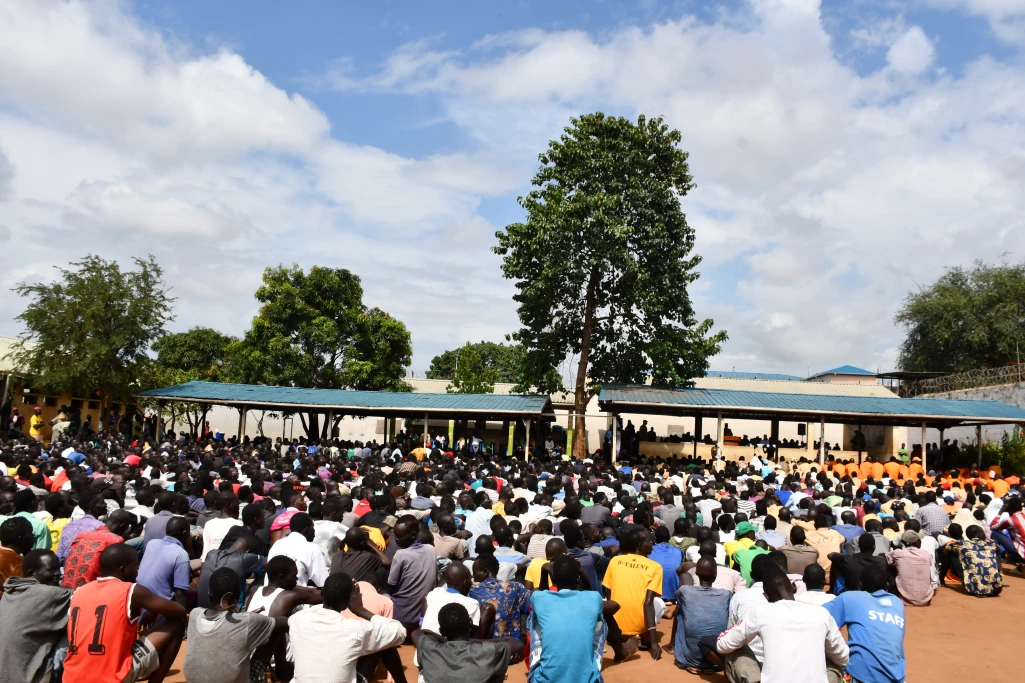
South Sudan Prisons Service has called for the construction of more structures to address issues of congestion in jails across the country.
It said there is too much overcrowding in the few main prisons.
Observers say there has been little expansion of prison infrastructure in South Sudan and the increasing number of prisoners has contributed to grim conditions.
In overcrowded prisons, they say, inmates sleep in tightly packed cell-blocks, and as a result, have difficulty sleeping at night. Facilities rarely allow convicts to be fully separated from remands, children from adults, or even women from men.
In Juba Central Prison alone, there are nearly 3,000 inmates – with various crimes – yet the space is meant for half that number.
Lt. Gen Michael Malou Makuach, Director of Juba Central Prison said there is need for a permanent solution to the infrastructural problem of the prisons service.
“We recommend the construction of new prison facilities,” he stated during a joint visit by the United Nations Mission in South Sudan, and a UN delegation from New York and Europe.
He disclosed that there are 2,847 prisoners crammed in the little space within Juba’s main prison.
He said the there are no distinct cells for convicts with various degrees of crime.
“Thefts, cattle raiding, defiling young girls, and adultery; these are the common crimes that are increasing the number of youth in prisons,” Lt. Gen Michael Malou stated.
According to the Human Rights Watch, approximately one-third of prisoners in South Sudan are on remand – that is they have not been convicted of any crime – but are held in prison, often unnecessarily, awaiting the commencement or resolution of their trial.
It said many remand prisoners are arrested but are not brought before a judge, and remain in prison because they are never given the option of bail.
“They wait for police to conclude investigations, for judges to schedule their trial, and for witnesses to appear in court for prolonged periods – sometimes for years,” a report by the rights body said.
The Human Rights Watch also believes arbitrary detention is rife, with those who should not have been detained at all spending months or even years in one of the country’s approximately 79 prisons, which are overcrowded and dirty, with food and health care in short supply.
Lt. General Henry Kuany Agwar, Director General of National Prisons Service agrees.
“People waiting trials have taken a lot of time without investigation and this is our complaint as administrators not even the prisoners. More than 1,000 are inside and we have challenges of food, medicines and sleeping beds. The prison is full but if they carry out the investigation, there are people who will go out. Those with small crimes or others who don’t even have crimes.” Kuany said
Human Rights Watch believes the conditions are enabled by massive challenges to developing a functional criminal justice system, such as a lack of trained civil servants, including judicial officers and police, and budgetary constraints.
Lt. General Kuany urges police to always expedite the process of investigations and not keep suspects in detention for longer than what the constitution allows. The constitution allows for only 24 hour detention of a suspect.
“The role of prison service is to close them inside and release them out if we are told but their delay in prison is the police that is responsible because it is the police that investigate,” he added.
Lt. General Henry Kuany, however, decried the increasing number of young people being incarcerated across the country.
“…I am angry! Why are South Sudanese youth filling up the prisons? There are a lot of crimes. Are you satisfied or hungry? All the prisons in the country are full of youth and the government doesn’t know the reason.”
Meanwhile, Patrik Engstrom, an advisor to the Police in Sweden, and the head of the visiting delegation said:
“For us it is very, very important to be able to come here today to meet you, to see these conditions and to understand the situation here so that we can best advice our governments. Our coming here is to understand better how our government can help the UN, South Sudan and you,” he stated.
South Sudan prison populations and conditions is believed to be worsened by chronic weaknesses across the criminal justice system.